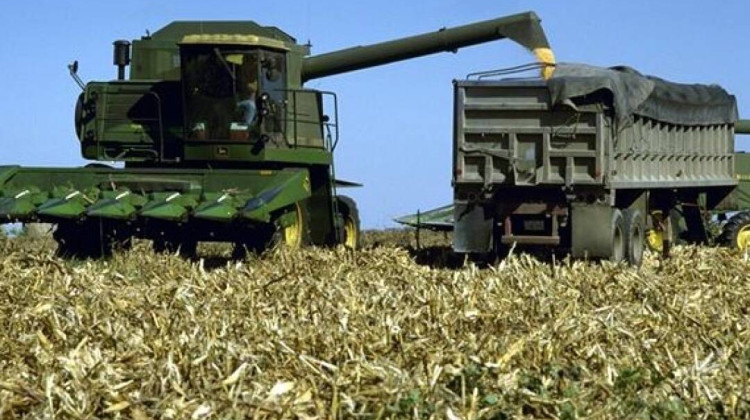
West Lafayette Street Commissioner Ben Anderson says supply chain problems are impacting his fleet.
Ben Thorp/WBAAAs nationwide supply chain issues affecting the computer chips and sensors that go into cars and trucks drag on, it has begun to affect an unexpected group: city street commissioners.
Garbage trucks, snowplows, and salt trucks use specialized computer chips and sensors to operate - and local commissioners say problems with either can put vehicles out of commission.
On the front end, chip shortages are keeping new trucks from being manufactured. And on the back end, sensor shortages are keeping existing trucks from being repaired.
Ben Anderson is the street commissioner for the City of West Lafayette. He said problems with sensors have taken some of his trucks off the road.
“At one point we had four main trucks that we use every day that were parked because I can’t get anything for them,” he said. “It’s become a full-time job just trying to track down stuff. You’re trying not to panic.”
That’s especially worrisome, Anderson said, because orders for new trucks have stalled.
“In April we were looking at 16, 17, 18 month lead times,” he said. “Today I can’t even order a truck. Can’t even order one. I cannot place an order for a chassis from any of the dealers that we work with.”
Anderson said for now his fleet can limp along - but he worries about the impact that chip shortages and broader supply chain issues will have down the road.
“People can relate to the toilet paper deal. ‘Oh my gosh, I’m going to run out of toilet paper so I’m going to go buy the store,’” he said. “People are doing that. I can’t get these parts, I can’t have my fleet be down, so I’m going to hoard.”
The problem isn’t just isolated to West Lafayette.
Jeff Theising is the president of the Indiana Street Commissioners Association. He said during a meeting with members this week, it became clear other street commissioners were having similar problems.
“It’s pretty widespread,” he said. “It’s spread across the state, the way that it sounds.”
Theising said, for now, street commissioners can work around problems with their fleet. But that’s dependent on how long the supply shortage lasts.
“If it gets better by mid-2022 I think we’ll be all right. But nobody knows. If it goes longer than that we’re all going to have some problems,” he said.
The Biden administration has forecast that a chip shortage is likely to persist at least until late 2022.
Some experts, however, say industry shortages will ultimately resolve themselves.
Ananth Iyer is a professor of supply chain and operations management at Purdue University.
“I’m fully confident that this will all sort out,” he said. “It’s difficult to forecast how quickly. But I’m pretty confident with all of the brainpower invested in this problem it will get fixed sooner rather than later.”
Iyer said the chip supply problem originated from auto suppliers decreasing their orders from chip manufacturers during the pandemic. Chip manufacturers pivoted to creating chips specifically for consumer electronics - like phones and refrigerators.
“The moment the auto companies realized people were coming back they waited too long, and that meant they faced a shortage in terms of supply,” he said.
Iyer notes that another problem underlining the shortage is that automobiles run on an older generation of chips compared with most consumer electronics. And for the chip manufacturers that switched over to creating the new generation of chips during the pandemic, it is easier to keep doing that.
“If you say all of my capacity is dedicated to this fast-growing market of smartphones and other things, now here is somebody who needs me to go back a generation or two, that takes too long -- I’m going to focus on the new thing,” he said. “It’s exactly the case that automakers want to be in sync with the current generation of chips so this problem they are facing would be much less of an issue.”
But, Iyer predicts, the shortage is likely just a blip.
Ben Anderson in West Lafayette agrees -- more or less.
“It’s probably a blip,” he said. “It’s a giant freakin’ blip right now.”
 DONATE
DONATE







 Support WFYI. We can't do it without you.
Support WFYI. We can't do it without you.